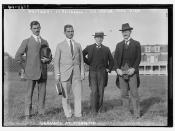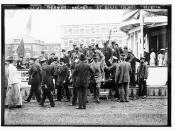From 1933, the Nazis Party have aimed to create the policy of Volksgemeinschaft, this is a component focused on the heart of the peopleÃÂs community based on traditional values of the German people. The German society underwent radical changes under the Nazi regime as Hitler introduced various policies that have had a substantial effect on 6 prominent groups: German women, youth, schools and universities and churches, working class and the Jews. The implementation of HitlerÃÂs new policies in the period 1933-1939 can be assessed to have significantly effected and transformed Germany society socially and culturally.
Women were immensely affected by the policy of Volksgemeinschaf as Nazi Party had conservative aims when it came to the role of women. Within months of Hitler coming to power, many female workers were sacked. Goebbels claimed that the main tasks of women were to ÃÂbe beautifulÃÂ, to bring ÃÂchildren into German societyÃÂ and only take jobs ÃÂsuitable for a womanÃÂ [ ].
These were epitomised in the propaganda slogan ÃÂKinder, Kuche and KircheÃÂ (children, kitchen and church). HitlerÃÂs intention was to create a new family life by emphasizing new policies, making it subject to Nazi ideology and hence he wanted to reverse the declining birth rate and increase the number of ÃÂracially pureÃÂ births in Germany.
Hitler had initiated changes that insisted women should return to their traditional roles as home makers and provide healthy offspring to the Nazi state. Child-bearing was encouraged in Germany, however this was only acceptable to the ÃÂAryansÃÂ not the Jews. Hitler has implemented policies such as financial incentive marriage loans and special medals were given to women who gave birth to large families. He also made divorce difficult, abortion and contraception illegal in order to achieve his objective effectively. Also, womenÃÂs organizations were created to indoctrinate women...

![[German vehicle tax registration issued to George Grantham Bain] (LOC)](https://s.writework.com/uploads/6/60390/german-vehicle-tax-registration-issued-george-grantham-bain-thumb.jpg)
